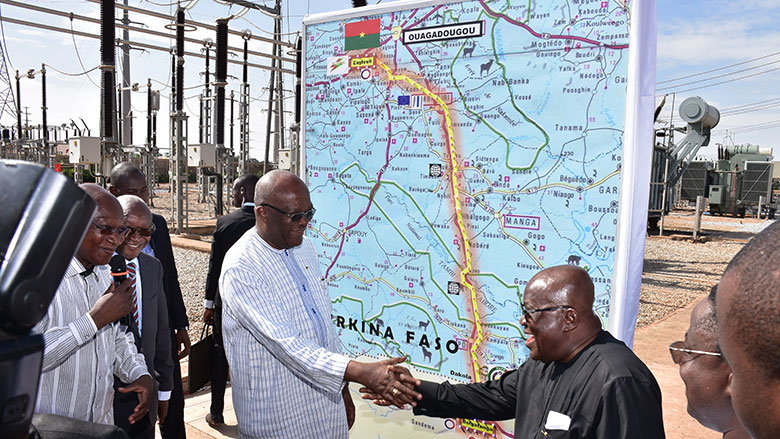Challenge
The region has important energy resources with one-third of the African gas and oil reserves. This is in addition to over 23,000 Megawatt (MW) of technically exploitable hydropower capacity. However, these resources were unequally distributed with the major sources of electricity supply located far away from the main consumption centers.
At the conception of the West Africa Power Pool (WAPP) program in 2011, there were specific challenges to Burkina Faso, including reliance on only one existing interconnection with Côte d’Ivoire (100 MW capacity). Additionally, about 90 percent of the population still relied on firewood and charcoal for the bulk of their energy needs. These challenges contributed significantly to Burkina Faso’s inability to improve supply and access to electricity.
In Ghana, electricity was produced from hydro and thermal (oil/gas) plants. The thermal generation mix in Ghana was transitioning from crude oil to natural gas as the main source of fuel. This relatively low-cost gas/hydro energy mix was to facilitate future unconstrained cross-border electricity exchanges across WAPP zones, and bring financial benefits to Ghana due to increased revenue for power sales.
Approach
The First Phase of the International Transmission Hub Project of the WAPP (APL3) Program aimed to reduce the cost of electricity supply to Burkina Faso, while also increasing Ghana’s electricity export capacity. This is the second cross-border interconnection for Burkina Faso, increasing the country’s import capacity by an additional 200 MW. The main focus of the project was the development of a transmission line between Bolgatanga in Ghana and Ouagadougou in Burkina Faso. The project also aimed to support the reinforcement of the transmission grid in Ghana, as well as the electrification of rural localities along the right-of-way in Burkina Faso.
Results
The project helped Burkina Faso successfully improve the security of electricity supply by importing electricity from Ghana. It also increased Ghana’s electricity export capacity. Project activities also led to more reliable networks in each country, and the adequacy and availability of the grids in Burkina Faso and Ghana also improved. The Bolgatanga-Ouagadougou transmission interconnection increased Ghana’s power export capacity. Other WAPP member countries, particularly Mali and Niger, are to benefit from Burkina Faso’s increased ability to wheel power from Ghana and Côte d’Ivoire.
Between 2011 and 2018, the project helped achieve the following results:
- Average weighted annual cost of electricity supply in Burkina Faso was reduced from $0.26 per kWh to $0.20 per kWh .
- Annual duration of outages in Burkina Faso due to generation capacity deficit/load shedding reduced from 130.00 to 8.00.
- Annual total hours of operation of the interconnection line was 849 (hours) representing over 98 percent availability at program completion.
- Ghana’s ability to export electricity increased by 200 MW.
World Bank Group Contribution
The project was supported by International Development Association (IDA) grants totaling $41.9 million. This included $16 million to Burkina Faso and a credit of $ 25.9 million to Ghana. The Adaptable Program Loan, within the framework of the World Bank’s Regional Integration Assistance Strategy for West Africa, was the vehicle for providing IDA credit support to the WAPP initiative.
Partners
The European Investment Bank committed $30.9 million and the French Development Agency committed $39.3 million. In parallel to this project, the French Development Bank financed the 330 kilovolt (kV) Kumasi-Kintampo-Bolgatanga Line (construction of substations and high voltage lines) at an estimated cost of $161 million. This project is part of grid reinforcement in Ghana, upgrading the transmission voltage to add 330 kV to the existing 161 kV.
Moving Forward
The World Bank will continue to support electrification scale-up in Burkina Faso and across the WAPP sub-region. It will also continue to provide technical assistance to the government of Burkina Faso to advise on relevant policy actions. With this second cross-border interconnection (after the first one with Côte d’Ivoire), Burkina Faso will be able to use the 225 kV Ghana-Burkina Faso transmission line to import clean and cheaper power from Ghana, and reduce the country’s acute power shortages due to lack of generation. This additional supply of electricity from Ghana will also allow Burkina Faso to avoid using petroleum fuel imports to generate electricity.
Beneficiaries
The construction of the distribution network and connection of households provided electricity access to 25 poor neighborhoods/villages in the outskirts of Ouagadougou and along the of right-of-way of the 188 km transmission line. Connectivity to the grid improved the standard of living for the local population and helped power local economic activities for women along the corridor.
“The interconnection will diversify the imports sources of energy to Burkina and have a major impact on the quality of service provided by Société Nationale d'électricité du Burkina Faso. It will reduce the load shedding caused by the energy deficit and also reduce the cost of power supply,” said François De Salles Ouédraogo, General Director of Société Nationale d'électricité du Burkina Faso (SONABEL).
